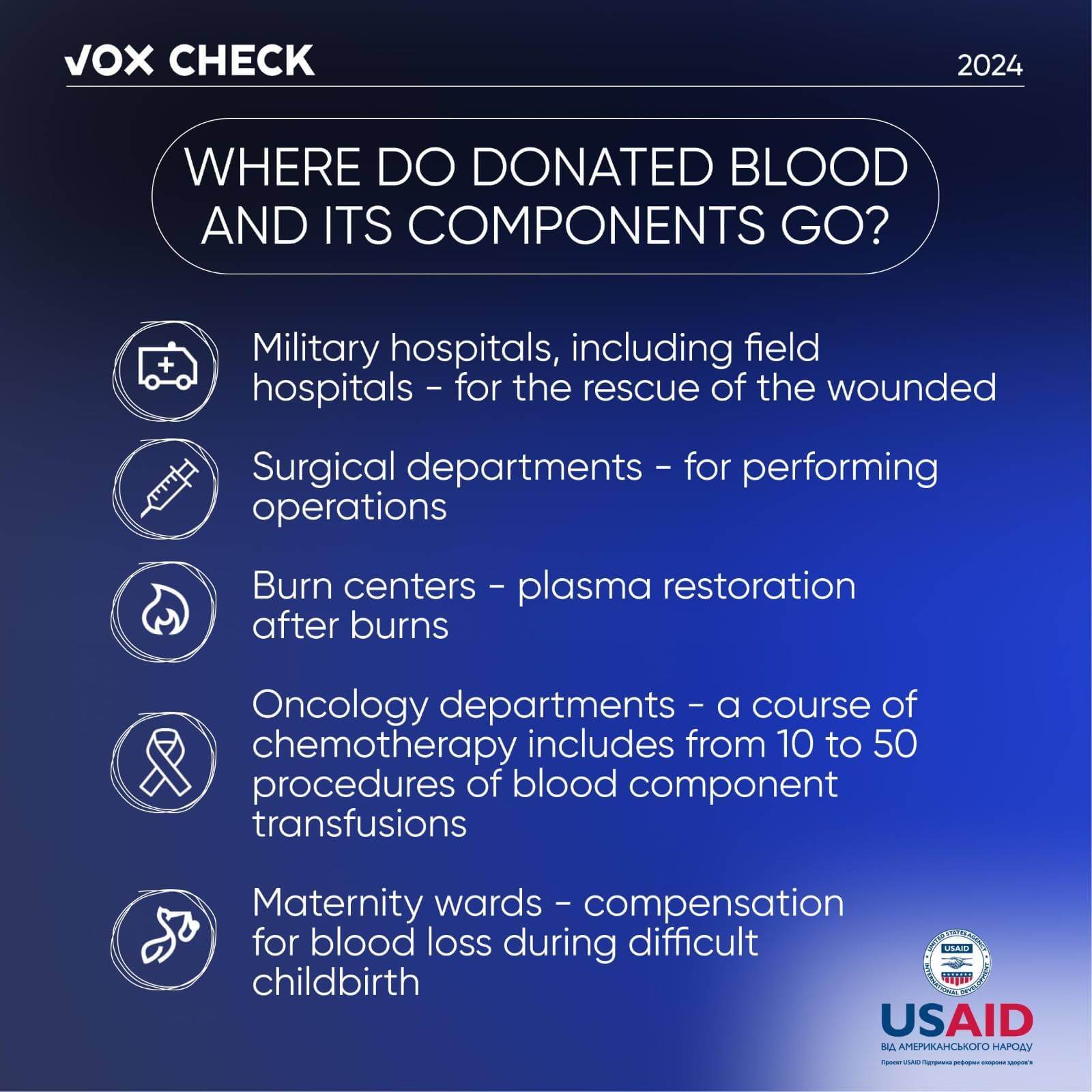One of the constant goals of propagandists is to spread lies about how the East and West of Ukraine are at odds with each other, and how residents of some regions “hate” others. All for the sake of dividing Ukrainians. For their stories, they look for all sorts of reasons that could potentially be the basis of a conflict situation. This time, the fabrications concern the donation of blood.
With the support of the USAID Health Reform Support project, VoxCheck analyzes and refutes public health narratives spread in the information space of Ukraine, Belarus, and russia on a weekly basis.
Information is being spread online claiming that residents of Kharkiv and neighboring regions are refusing to help the brigades from the West of Ukraine, including the 14th Separate Mechanized Brigade. This concerns, in particular, the provision of donor blood. Because of this, blood donation has started to be collected wherever possible. In particular, in Kyiv, a voluntary blood donation campaign has been announced, but people are unwilling to share their blood.
Screenshot of the post
What’s the reality?
Such assumptions are absurd because Ukraine has established a systematic planned blood donation system, which allows for maintaining steady reserves of blood and its components. The coordination of supply between regions is managed by the specialized state institution “Ukrainian Transplant Coordination Center”. Blood, especially for military purposes, is continuously collected across the entire territory of Ukraine. The Ministry of Health of Ukraine regularly announces the need for blood in all regions, with all blood groups needed in most regions. Therefore, the announcement of the need for blood in Kyiv cannot in any way indicate that in the East, people refused to donate blood.
The 14th Separate Mechanized Brigade named after Prince Roman the Great from the city of Volodymyr (Volyn Oblast) is indeed fighting in the Kharkiv region. Since 2014, the brigade has been carrying out combat missions in the Donetsk and Luhansk regions during the Anti-Terrorist Operation (ATO) and Joint Forces Operation (JFO). The fact that the brigade is based in a city in the Volyn Oblast does not mean that the entire composition of the brigade consists of residents of that city or region. Members of the brigade may be military personnel from any region of Ukraine.
Since the beginning of 2024, there have been no donor points in hospitals in Kharkiv. Blood donation is only possible at the Kharkiv Regional Blood Service Center and its branch in the “Nikolsky” shopping mall. This does not mean that blood collection points have closed due to a lack of willingness to donate blood — they have been transformed into blood banks, where blood is stored and transfused to recipients. The blood center itself performs the function of blood collection because it can ensure the safety of the procedure and conduct necessary examinations.
According to the spokesperson of the Kharkiv Regional Blood Service Center, Valentyna Taran, mobile brigades are operating throughout the region to allow volunteers to donate blood. “A mobile brigade is a complete cycle of donor reception, just like we have at Klochkivska. Currently, our schedules for mobile brigades are ready for June, and at least three to four, sometimes five times a week, our brigade goes out to the region, to enterprises, institutions — wherever we have such strong cooperation,” Taran comments. The spokesperson also notes that there has been no decrease in blood collection indicators since January 1, 2024.
As explained by the Ministry of Health of Ukraine, the mechanism for providing for the needs of the Security and Defense Forces with donor blood takes into account the demand for necessary volumes of blood from combat units. Accordingly, it enables the timely preparation and delivery of these volumes to the area of combat operations. The process of obtaining donor blood and its components by medical units of the security and defense forces consists of the following actions:
- Each medical unit designates a person responsible for ordering donor blood and its components (military medics independently decide how they prefer to order blood — from a brigade or from individual medical units).
- The blood center provides the necessary volume of donor blood and its components, while the regional coordinator ensures receipt, transportation, and distribution according to the requests.
This information piece was produced with the assistance of the United States Agency for International Development (USAID), provided on behalf of the people of the United States of America. This article’s content, which does not necessarily reflect the views of USAID, the United States Government, is the sole responsibility of Deloitte Consulting under contract #72012118C00001.
Attention
The author doesn`t work for, consult to, own shares in or receive funding from any company or organization that would benefit from this article, and have no relevant affiliations




